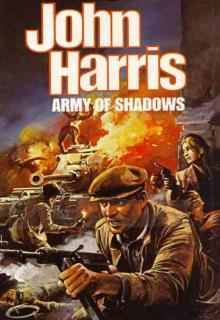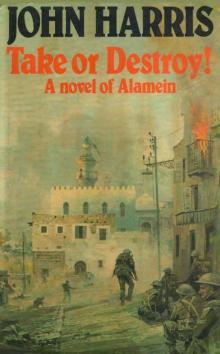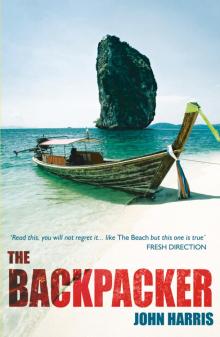- Home
- John Harris
Picture of Defeat Page 3
Picture of Defeat Read online
Page 3
‘I think,’ Jones said slowly, ‘that it might be a good idea for you to go and check on those paintings of Bocco Detto Banti at Vicinamontane, after all.’
Two
Pugh frowned. ‘Isn’t Vicinamontane right up near the fighting?’
Jones beamed. ‘The German line runs through Venafro and Baranello to Vasto. It’s not a lot further north.’
‘There’s an altarpiece there, isn’t there? By Botticelli or somebody.’
‘Not quite,’ Jones said. ‘It’s by Simonetta and it’s in the church of San Isidro at Avizano nearby.’
‘It’s supposed to be pretty good.’
‘It’s supposed to be priceless. I’m trying to get permission to have it brought to safety, if the Germans haven’t nicked it. They hadn’t, the last we heard.’
‘They must be slipping. They’ve nicked everything else in Europe.’
‘As long as Italy was an ally,’ Jones pointed out, ‘even an ally that was a liability, Hitler managed to hold off everybody who was wanting to grab anything valuable. But when Mussolini went and we landed, he issued an order – a Führerbefehl no less – that Italian art treasures were to be taken to the Reich to save them from the Anglo-American predators. As a result, art galleries began to evacuate their treasures and store them wherever they could for safety, in depositos – remote villas, farms, castles, monasteries. They thought – reasonably enough, I suppose – that we’d pinch ’em, and I suppose we did take a few. But in fact it was the Germans they ought to have worried about. They shifted everything they could carry from here to Cassino and then announced they were moving them to the Vatican. It was looting carried out with good German efficiency, and it’s my bet only a few arrived. You might look in on the old altarpiece while you’re in Vicinamontane and see what the chances are of removing it.’
‘What’s the urgency? Are the Germans going to put in a counter-attack?’
‘They aren’t able to attack any more. They’re finished.’
‘They don’t seem to be finished,’ Pugh commented. ‘They attacked like hell at Battipaglia.’
‘That was in the early days.’
‘They did again at Semo. They probably will at Vicinamontane.’
‘You don’t want to go, do you?’
‘No.’
Jones sighed. ‘Look, Tom, old lad,’ he said, leaning his elbows on his desk, ‘there are good reasons. You made the mistake of trying to smash the Neapolitan black market and it’s obvious they want you removing. Tasker suggested you should handle it.’
‘What have I done to Tasker?’
‘You’re too unaccommodating. I know there’s a war on and people are a bit ruder in wartime than normally. They even shoot people occasionally. But you’re well known for your temper, and, if it’s of any interest to you, I’ve put you in for a commission. I bypassed Tasker with that one and I think you’ll get it if you keep your nose clean.’
‘I’m not so bloody sure I want a commission.’
‘I didn’t think you would,’ Jones said wearily, ‘but if I have my way you’ll get no choice. It makes the journey easier and, with your knowledge of art and law, you’re wasted as a sergeant. So keep out of trouble. Either you go back to North Africa or you go to Vicinamontane. The one thing that’s clear is you’ve got to get out of Naples before someone puts a bomb under your bed.’
It seemed easier to go to Vicinamontane. At least it was a step nearer to Severino Campagna, where Pugh had stored his paintings in 1940 and there might be a chance of recovering them.
Nevertheless, he continued to protest. He didn’t want to go to Vicinamontane and, stone or no kidney stone, he wanted to see Tirandolo nobbled. He knew he was involved with the penicillin racket and even if he’d been suffering from congenital leprosy he would still have enjoyed nobbling him. None of the rackets the war had let loose was worse than the traffic in drugs. Black marketeers did at least give you something in return for your money, even if what they offered was stolen and they grossly overcharged. Penicillin was different because they were dealing in death.
Medical orderlies had sold penicillin to civilian doctors for meningitis from the early days – and perhaps that was understandable, though it benefited only the rich – and nobody had worried too much when one of the orderlies was caught and punished. But lately the people behind the racket had begun to grow greedy and, as it had become more difficult for the orderlies to provide the stuff, the racketeers had started to dilute it with water or fine sand. The result was loss of limbs and lives, even madness. Pugh had been shown a few of the affected children by Agent Szogoscz, and it had become his dearest wish to put Tirandolo and the people behind him where they ought to be.
‘Look,’ he said, still trying to avoid Vicinamontane, ‘I’m just getting dug in, in Naples.’
‘Then,’ Jones said, ‘you’d better produce your little spade and dig yourself out again. People are after your blood. Why the hell did you let the Yanks get you involved in investigating this penicillin thing?’
‘It was time somebody did,’ Pugh said hotly. ‘And I found traces of penicillin in his car.’
‘So you stuck him in a cell at Poggio Reale. The big boys who’re behind him promptly set to work to get him out.’
‘With a doctor’s certificate obtained by bribery.’
Jones sighed again. ‘You can’t beat them, Tom, old son. It’ll drag on and on until he’s finally allowed to go.’
‘All the more reason why I shouldn’t go to Vicinamontane. I didn’t like the smooth bastard and I’m willing to risk a bomb under the bed to get him.’
‘I’m not,’ Jones said.
‘Naples needs me.’
‘So do a lot of other places. You’re supposed to be able to cover everything. Especially art.’
Pugh reviewed his military history without much enthusiasm.
‘What’s so special about Bocco Detto Banti, anyway?’
‘Well, for one thing, he’s a long way from Naples and the people who threw that grenade at you. And also he’s now dead.’
‘When?’
‘Yesterday. Rome Radio broadcast it. We picked it up. He was considered to be part of the rebirth of Italian art under Fascism. Didn’t someone once call him the last of the Impressionists?’
‘Well,’ Pugh admitted, ‘he was good at brushwork. But he hadn’t much vision. He’d have been a great success as a magazine illustrator. The Italians’ attitude to art these days is painstaking but a bit unoriginal. I always reckoned he was a bit of a hack.’
‘Not everybody did and’ – Jones smiled – ‘you’re hardly competent to judge. You were a bit of a hack yourself.’
Pugh acknowledged the fact without bitterness, accepting that Jones, who was an old friend, wasn’t being sarcastic or unpleasant, just realistic. ‘You won’t find him in the Louvre,’ he argued.
‘There are a lot of great artists who haven’t ended up in the Louvre,’ Jones said. ‘The Impressionists were never very popular with galleries like the Louvre. But they’re accepted now. Even Picasso used to be regarded a bit askance, but not any more. How do we know Detto Banti won’t be the same?’
Pugh gave up his line of argument – he could see he was on a losing streak – and tried another. ‘I’d have thought Naples was more important than a second division painter.’
‘Of course Naples is important. But this is important too. It’s been decided that somebody should look into it.’
‘Who decided?’
‘The High Altar. The word came down at once via Tasker. He said signals have been going back and forth between here and London like yo-yos,’ Jones sighed. He got on well with his sergeants for the simple reason that most of them were better linguists than he was, but Pugh was always different. ‘Now Detto Banta’s dead the powers that be want to make sure the Germans don’t get his paintings.’
‘I bet there aren’t any paintings. I only saw one or two when I was there.’
‘There must have been
a few he didn’t tell you about. After all, you were hardly important enough for him to lay them out on the floor for you and ask you your opinion.’
It was Pugh’s turn to sigh. ‘He wasn’t even Italian,’ he said. ‘He was English. Lived in Chelsea for years.’
‘That’s precisely why the powers that be have decided they want his pictures brought to safety. According to Tasker, they think that if we don’t get them, they’ll be dispersed and lost for ever. You know what the Italians are like. They’d sell their own grandmother.’
‘I’m surprised the poor starving sods haven’t tried eating her. How do we know the paintings haven’t already been dispersed?’
Jones shifted restlessly. Sometimes he found Pugh hard work. ‘The word’s gone round the art dealers like a forest fire. Da Sangalla, of Monumenti e Belli Arti, is girding up his loins to see what he can do and if he gets his hands on them it’s going to be difficult to get ’em off again. Even he might be too late. And Tasker says it was decided in London that Detto Banti was British and that his paintings are part of the British art heritage.’
‘Who decided?’
‘Someone at a very high level.’
‘There can’t be any paintings,’ Pugh said again. ‘He couldn’t hold a brush. I visited him.’
‘That,’ Jones said, ‘is precisely why you’ve been chosen to visit him again. See his brother. He’ll help. At least he will if he’s got any sense, because he lived in England, too, and he’s now busily claiming to be British.’
‘So would I, if I lived here.’ Pugh grinned. ‘That’s why half the girls in Italy are trying to marry British squaddies. How many paintings are there supposed to be?’
‘Tasker says it’s thought there are around a dozen. They were found in the cellar.’
‘What were they doing there?’
‘Does it matter, for God’s sake?’ Jones finally lost his temper. ‘So long as they’re still there. Did you meet the brother?’
‘No. But I heard of him. Name of Marcopolo. Bocco paid for his keep and he did the small jobs about the place. Mixing colour. Making frames. Stretching canvas. Fetching the beer. That sort of thing. Anyway, why can’t we just order a guard slapped on them? Can’t we make an order forbidding their removal?’
‘It wouldn’t be much good if the Germans do put in a counter-attack in that sector. They could grab everything.’
Pugh’s indignation showed. ‘If I’m there they could grab me, too,’ he said. ‘And would the Germans want them? Detto Banti had nothing to do with Germany.’
Jones sighed. ‘You’ve heard of Goering, I suppose?’
‘He’s that fat chap, isn’t he?’
‘Don’t try to be funny! He’s been collecting art treasures from all over Europe. It’s known that that place he built near Berlin’s full of stolen gems.’
‘He won’t want Detto Bantis,’ Pugh insisted. ‘If you’d said Rembrandt I might have understood it. Mind you, Hitler might covet them. That tasteless bastard would grab The Stag at Bay if it had been painted by a German or an Italian. What about Detto Banti’s family? Don’t they have a claim to the bloody pictures? He married twice.’
‘Both his wives predeceased him. He had no children.’
‘Then won’t his brother inherit them? Italian law’s much the same as British law and they’ll go to the nearest relative.’
‘Look,’ Jones’ temper was growing hotter. ‘I’m not interested in the ins and outs of it. Tasker says it’s been decided that Detto Banti’s English and that the paintings are wanted in England. Personally, I don’t give a bugger about the bloody things. Walt Disney’s about my limit as far as painting’s concerned. See Tasker. He’s the one who suggested it. He’ll tell you more.’
Colonel Tasker had an office near the catacombs of San Placido and a suite of rooms in a hotel behind the church, with a batman to look after him so he could live in style.
His sergeant was in a bad temper. ‘He’s not here,’ he snarled to Pugh. ‘He’s in the bloody O Sole Mio bar again.’
Pugh smiled. It was common knowledge that Colonel Tasker spent a great deal of his time in the nearby bar, a smart little place with a small restaurant alongside where Tasker ate his meals, all done up – probably with American money – to attract American officers.
‘If he could’ – the sergeant sounded bitter – ‘he’d conduct the whole bloody business of the British army in the O Sole Mio. The bugger’s never here when we want him. He thinks being an officer consists of sitting back and drinking while the lads do the work. Whenever the general wants him or something like that, we have to send a runner down to dig him out.’
‘What’s the interest in the O Sole Mio?’ Pugh asked. ‘A barmaid?’ He made shapes with his hands.
The sergeant scowled. ‘Christ knows. There is one but she’s forty. Still’ – his expression changed – ‘he’s fifty, so why not? But I wouldn’t have thought she was his type. He prefers American Waves. Gets introduced to ’em by Baracca, that Yank colonel he knows. He likes the O Sole Mio, too. If it’s important, you could nip down there. His car’ll be outside. You can recognise the place by the horse tied to the lamp-post. Undertaker – name of Cirri – keeps his hearse round the back. As far as I can see, he spends more time shoving back the booze than he does shoving stiffs underground in the Campo Sterano cemetery. He probably supplies Tasker with bootleg brandy.’
‘I think I’ll wait,’ Pugh said. ‘He might not appreciate my interrupting a tête-à-tête with an undertaker.’
Tasker, a tall, plump, red-faced man who was running the military district, appeared half an hour later but made no apologies for his absence. He had once been in a good regiment but had left it before the war to go into one of the London financial houses, and returned in 1939. He was hand-in-glove with the Americans who were the power in AMGOT, and Pugh had often wondered if, like some of the Americans, he was hand-in-glove with Vito Genovese, too. Paintings had been cut from the frames in one of the occupied palazzos and a fifty-piece dinner set in Doccia porcelain had disappeared; and when some of the spoils were found carefully packed for taking home by air, Pugh had remembered that Tasker had a brother in RAF Transport Command. Colonel da Sangalla had certainly considered he’d been behind it.
Pugh tried to make his feelings clear. ‘If we grab these paintings,’ he said, ‘we’ll have the Italians coming down on our necks as the Greeks did about the Elgin marbles.’
Colonel Tasker glanced at the American officer sitting near his desk. Colonel Baracca was a handsome man of Italian extraction, with rimless glasses and a pencil-line moustache. It was said he had once tried to break into Hollywood but, discovering that though he had the right features he hadn’t the right ability, had settled to become an actors’ agent. He and Tasker were great friends and Pugh had often wondered – assuming that Tasker was involved in one of the rackets – if Baracca was, too.
Tasker’s mouth had tightened. ‘The Italians are in no position to complain about anything,’ he said.
Baracca nodded. ‘Until September,’ he observed, ‘the bastards were in with the Krauts and they’re existing now only because of our charity.’
‘They’re not doing much existing in Naples,’ Pugh said bluntly. ‘Most of them are starving.’
‘Then, hell, it’s up to them to put their house in order.’
‘That’s something they’ll never do if everybody goes around helping themselves to their property. Who’s the authority behind the request?’
‘Commission for the Protection of Arts and Monuments,’ Tasker said at once.
‘And the Fine Arts and Archives Section of SHAEF,’ Baracca added.
‘Why are they interested? Bocco Detto Banti wasn’t an American.’
‘For God’s sake, Pugh,’ Tasker snapped. ‘You’ve been given a job! Do it! You’re the obvious man for it. You speak Italian. You know about art and you know about Italian painters because you’ve painted here. I’m told you even once met this bloody De
tto Banti.’
‘That won’t help much now. He’s dead.’
‘His family will listen to you. And you know the law. I’m told you were once a lawyer, too.’
Baracca, who looked like a man who enjoyed money, stared at Pugh as if he were mad. ‘Why’d you give up a career like that?’
‘People do. Gauguin did.’
‘Well, if you know the law,’ Tasker said, ‘you’ll know how to get round it. You’re to bring them back with you.’
‘On the back of the motorbike?’
‘You can acquire a car.’
‘From the pool?’
‘You’ll provide it yourself.’
‘Where from?’
‘Dammit, Sergeant, commandeer one, if necessary! We’re running this country. It gives us certain privileges. You’ll be given funds. All we ask is that you bring those pictures back – no matter how many there are or how you do it. We want those canvasses. See we get them. And, Sergeant—’
Pugh halted in the doorway.
‘Try, for the love of God, to look like a soldier instead of a fairground tout.’
Three
Pugh’s preparations for his departure north coincided with an air raid. Established now in what they called the Gustav Line, a line of fortifications which stretched right across Italy to the Adriatic, and determined to make the Allies fight every inch of the way north, the Germans were hitting back with counter-attacks and salients, and air raids on any city the Allies held.
As Pugh started to clear the paper from his desk, Sergeant O’Mara, a slight black-jowled man who enjoyed his clandestine domesticity in the Casa Cailafati with his Italian girlfriend, appeared alongside him. He was investigating the theft by a British officer of a priceless collection of Roman jewels he was supposed to have been guarding. They had been replaced with imitations, and O’Mara found it funny.
‘Sure to God, was he disgusted!’ O’Mara always liked to behave in the way he thought stage Irishmen behaved. ‘When he sold ’em, he found the originals had been changed before he arrived, and that what he’d pinched were imitations, too. The Eyeties are handlin’ it now an’ I’m doin’ the report. It’s goin’ to take all day, too. So this one’s for you.’ He tossed a file down in front of Pugh. ‘Peter Weedon, Private, Royal West Kents, otherwise Private First-Class Peter C Weeden, US Army. He decided he’d be better paid as a Yank so he left our lot and joined theirs. ’Tis nabbed by the military police he’s been as a deserter.’

 China Seas
China Seas The Mercenaries
The Mercenaries Road To The Coast
Road To The Coast The Thirty Days War
The Thirty Days War The Old Trade of Killing
The Old Trade of Killing Ride Out The Storm
Ride Out The Storm Corporal Cotton's Little War
Corporal Cotton's Little War Fox from His Lair
Fox from His Lair Paint The Rainbow
Paint The Rainbow Flawed Banner
Flawed Banner Covenant with Death
Covenant with Death So Far From God
So Far From God The Sea Shall Not Have Them
The Sea Shall Not Have Them The Cross of Lazzaro
The Cross of Lazzaro Smiling Willie and the Tiger
Smiling Willie and the Tiger Harkaway's Sixth Column
Harkaway's Sixth Column The Sleeping Mountain
The Sleeping Mountain The Claws of Mercy
The Claws of Mercy North Strike
North Strike Picture of Defeat
Picture of Defeat Army of Shadows
Army of Shadows Right of Reply
Right of Reply Getaway
Getaway The Lonely Voyage
The Lonely Voyage Take or Destroy!
Take or Destroy! The Backpacker
The Backpacker A Funny Place to Hold a War
A Funny Place to Hold a War Swordpoint (2011)
Swordpoint (2011) A Kind of Courage
A Kind of Courage